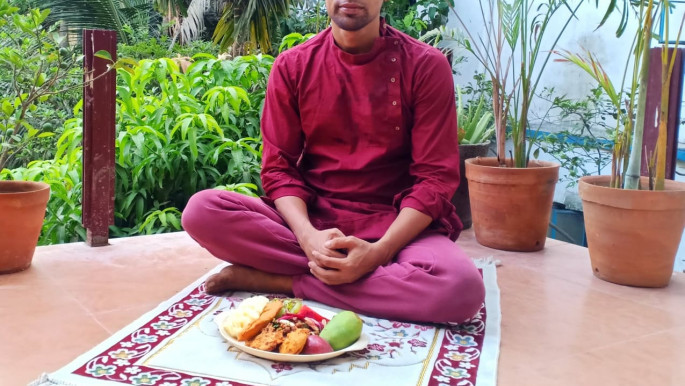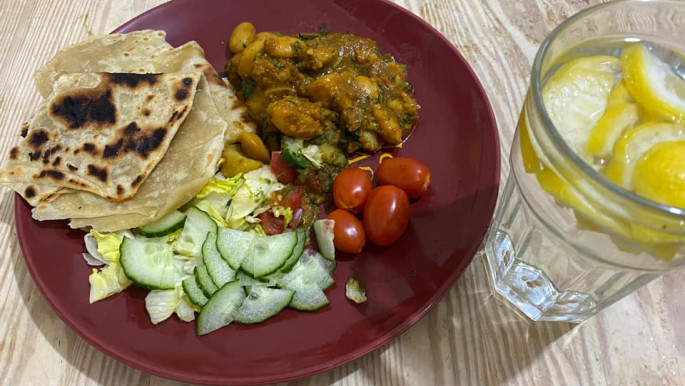A very vegan Ramadan: Why some Muslims believe veganism follows 'the true message of Islam'
However, for one group of celebrants, Ramadan is always different: vegan Muslims. In addition to fasting from sunrise to sunset, they must abstain from eating or otherwise using animals and animal products.
Nevertheless, in lots of ways, vegan Muslims are the same as their co-religionists and like the majority of the faithful, also love eating great food for iftar – the meal taken in the evening after a long day of fasting – albeit without any meat, dairy or eggs.
This is a time for "special food," Altab Hossain, a 33-year-old full-time animal rights activist from Kolkata, India, told The New Arab.
"There are fritters which you don't get generally in other months. And, also… people consume a lot of fruit," he said, something the typically poor Muslim population in his area struggles to afford. Despite inflated prices during Ramadan, they still make sure to buy some.
 |
| Altab Hossain with his vegan iftar waiting for the maghrib azaan to break his fast [Photo credit: Samaira Aziz] |
When asked about his favourite iftar meals, the Vegan India Movement founder replied, "I love chana masala," the excitement for the chick pea dish evident in his tone of voice. Vegan haleem, a kind of stew, was among his other preferences.
Read also: #VeganRamadan: Musakhan recipe, but make it vegan
Dawud Marsh, 55, from East London, has been vegan for 35 years and became Muslim 14 years ago. He enjoys home-cooked vegan samosas and pattes. These are "always my favourite," he said, explaining that his wife is Mauritian and listing a selection of "finely sliced" and "fresh" ingredients. For suhoor, the pre-sunrise morning meal, he generally opts for porridge with mango pulp.
Marsh added that he is "blessed" to have a family so accepting of his veganism and Islam, though the pandemic means they participate in iftar through video calls.
Read also: Lockdowns, quarantines, restrictions: British Muslims forge digital pathways to family during a lonely, Covid Ramadan
For others, like Ahed Kayed, 22, a university nutrition student from Nablus, being vegan during a time of such great consumption is fantastic for her wellness. "The non-healthy food is not vegan, so basically, I'm away from it," she said.
Despite all this joy, challenges exist. As is common for vegans of all and no faiths, many find their families don't quite understand – despite good intentions. Ahlam Tarayra is a cultural Muslim and the co-founder of Baladi – the Palestine Animal Rescue Team.
She said last year she attended a family iftar after being invited by her uncle. When she arrived, her meat-free stuffed courgettes had been cooked together with the mince-filled ones, rendering them inedible. Another dish had no meat inside, but the outer shell had some mixed in.
 |
I don't think it's fair to reward yourself [with] the blood of other animals just because you were fasting |  |
Lina Hage, 31, from Calgary, Canada found some non-vegan Muslim relatives even criticise her lifestyle. They believe she is "challenging Allah" by "insisting that [she is] more compassionate than him," since, within certain rules, meat and other animal products are generally deemed permissible in Islam.
The idea she views herself as above God is "far from the truth," she stressed.
Indeed, many vegan Muslims tie their lifestyle in with their faith, or even consider it a compulsory part of contemporary Islam.
Tarayra believes veganism aligns more closely with the principles behind the holy month which, she explained, are self-discipline and empathy for the poor.
Since becoming vegan, Tarayra has discovered that "food doesn't feel [like that] big a deal anymore… It's not something that you are obsessed about. It's just like a normal part of your life." This grants her the ability to exercise more control.
She also considers animals to be among the less fortunate she is attempting to act in solidarity with. "I don't think it's fair to reward yourself [with] the blood of other animals just because you were fasting," she said.
Vegan Muslims also commonly take the idea meat is permissible head on by arguing that circumstances have changed since the time of the Prophet.
 |
You must be vegan to live by 'the true message of Islam, the true message of the Prophet' |  |
For example, these days, animal products are no longer produced in a halal way, according to Hossain. We live in a time when day-old male chicks are macerated, or squashed to death, and week-old male calves are slaughtered because they can't produce eggs or milk.
Although the Prophet ate meat according to tradition, for Hossain, if the Prophet Muhammad were alive today, he would encourage veganism given the brutality of modern battery farming. Hossain believes that the Prophet was the best animal rights advocate in the history of [the] human race as he instructed his companions not to overburden their camels, rebuked them for destroying an anthill, and so on.
For this reason, plus health and environmental factors, you must be vegan to live by "the true message of Islam, the true message of the Prophet," Hossain believes. He added that veganism is even more important during Ramadan, when Muslims try to be as moral as possible.
"Even thieves stop stealing during this month. This is the kind of power this month has [for] Muslims," he explained.
While Hossain fears for his life over apostasy allegations if he expressed certain views in his local community, his digital work is showing potential. Although most Muslims – and Hindus – do not welcome invitations to become vegan, people do at least approve of the Ramadan food pictures he uploads to social media.
 |
| Homemade roti with salad, and potato and chickpea curry [Photo credit: Dawud Marsh] |
Marsh raises similar concerns about the meat non-vegan Muslims eat, questioning if they are certain it is halal.
"Did the animal suffer during its life?" he enquires. "They cannot answer this."
Marsh added that he prays for animals raised in factory farms and contemplates on the Prophet's attitude towards animals, explaining this helps him stem his body's cravings and improve his relationship with God.
Beyond animal welfare, many also see Ramadan as currently extremely wasteful. People feel they must buy lots of meat to share around out of a cultural standard of generosity, Kayed said, adding that much of this goes uneaten.
However, she has found people don't have this belief with plant-based foods, and so less ends up disposed of.
As an ethical project, adopting a vegan lifestyle makes you more reflective about your actions in general, according to Tarayra. This means you are more likely to think about other issues like providing single-use plastic cups and plates to guests, a concern she was not alone in raising.
At a time when many fear for the future of the planet, a vegan Ramadan may, therefore, seem attractive, even though it isn't always easy.
Nick McAlpin is a staff journalist at The New Arab.
Follow him on Twitter: @NickGMcAlpin




 Follow the Middle East's top stories in English at The New Arab on Google News
Follow the Middle East's top stories in English at The New Arab on Google News


